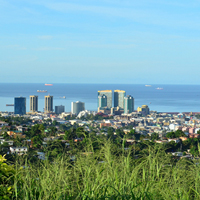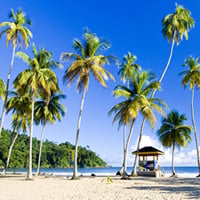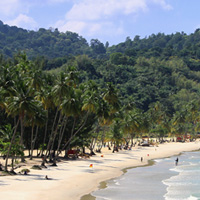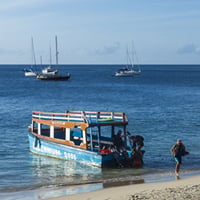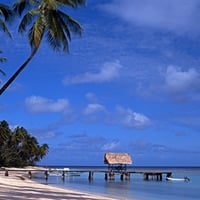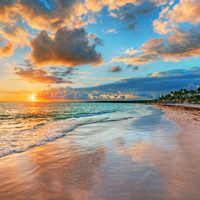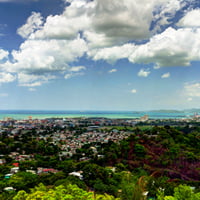Trinidad & Tobago
Coastal BeachesTrinidad and Tobago is a twin-island country situated off the northern edge of South America, lying just off the coast of northeastern Venezuela and south of Grenada in the Lesser Antilles. It shares maritime boundaries with other nations including Barbados to the northeast, Grenada to the northwest, Guyana to the southeast, and Venezuela to the south and west. The country covers an area of about 5,128 square kilometers and has a diverse population of over 1.3 million people. Trinidad, the larger and more populous of the two islands, is bustling with energy and is the industrial and economic powerhouse of the nation, known for its oil and gas reserves. Port of Spain, the capital city, is a hub of commerce and culture with a vibrant mix of ethnicities and traditions, reflecting the country's history of colonization and immigration. Tobago, on the other hand, is much smaller and is known for its more laid-back atmosphere and tourism-centric economy, with stunning beaches and a variety of resorts. The islands boast a rich cultural tapestry, with influences from African, Indian, European, and indigenous peoples, which is reflected in the country's music, festivals, and cuisine. Trinidad and Tobago is famous for its annual Carnival, a pre-Lenten festival with elaborate costumes, calypso music, and soca dancing. The country's biodiversity is notable, with numerous species of birds, reptiles, and other wildlife, making it a destination for eco-tourists and nature enthusiasts. The economy is primarily industrial with a focus on petroleum and petrochemicals, but the government has been working on diversifying into sectors such as tourism, agriculture, and information and communications technology. The nation's official language is English, and it has a well-developed education system and a high literacy rate. Trinidad and Tobago is a member of the United Nations, the Commonwealth of Nations, CARICOM, and other international organizations, playing an active role in regional and international affairs.
 GeoBlue
GeoBlueGet Quote
GeoBlue is a trusted leader in international health insurance. Wherever your destination, GeoBlue can keep you and your family covered with the right health insurance. Get a GeoBlue Quote Today!
 GeoBlue
GeoBlueGeoBlue is a trusted leader in international health insurance. Wherever your destination, GeoBlue can keep you and your family covered with the right health insurance. Get a GeoBlue Quote Today!
Get Quote
Living in Trinidad & Tobago
Best Places to Live in Trinidad & Tobago
Visa & Residency
Obtaining a residency in Trinidad & Tobago involves several steps and the process can be considered average in terms of difficulty. Expats looking to reside in Trinidad & Tobago typically apply for a Work Permit or a Student Permit, depending on their purpose of stay. To obtain a Work Permit, an expat must first secure a job offer from a company in Trinidad & Tobago. The employer must then apply for the Work Permit on behalf of the expat. This process involves submitting various documents, including a job offer letter, qualifications of the expat, and proof that the position could not be filled locally. The Work Permit is usually valid for one to three years and can be renewed. For those seeking to study in Trinidad & Tobago, a Student Permit is required. The application should be made after gaining admission to a recognized educational institution in the country. The student will need to provide evidence of acceptance into a program of study, proof of financial support, and a valid passport. Both Work and Student Permits can lead to residency if the expat continues to renew their permit and remains in good legal standing. After legally residing in the country for a continuous period, expats may apply for permanent residency. It is important to note that there is no specific visa category for digital nomads in Trinidad & Tobago. However, many digital nomads enter the country on a tourist visa, which allows them to stay for up to 90 days. This visa does not permit employment in the country, so digital nomads must ensure their income is sourced from outside Trinidad & Tobago. The process of obtaining a residency visa in Trinidad & Tobago requires patience and careful attention to detail, as the expat must ensure all documentation is accurate and complete. Working with the employer or educational institution in Trinidad & Tobago can help streamline the process. It is also advisable to consult with the Ministry of National Security or an attorney for the most current advice and assistance.
Healthcare in Trinidad & Tobago
The system in Trinidad and Tobago is a mix of public and private healthcare services. The public healthcare system is accessible to all citizens and legal residents, providing a range of services from primary care to specialized treatments, free of charge at the point of delivery. However, the public system often faces challenges such as long wait times, resource constraints, and varying levels of service quality across different institutions. Private healthcare, on the other hand, offers faster and often higher quality services but at a cost, which can be covered by private health insurance or out-of-pocket payments. Expats and digital nomads can access public healthcare once they become legal residents or if they contribute to the National Insurance Scheme, though many opt for private health insurance to ensure quicker and more comfortable service. The quality of healthcare can vary, with some private institutions offering services comparable to developed countries, while public hospitals may not meet those same standards.
Cost of Living
The cost of living in Trinidad and Tobago is considered moderate when compared to other countries in the region. While some goods and services can be expensive due to importation costs, overall, residents benefit from subsidized utilities and fuel, which helps to balance out expenses.
Weather
Trinidad & Tobago experiences a tropical climate with two distinct seasons: the wet season and the dry season. The wet season typically runs from June to December, bringing heavy rainfall and high humidity. The dry season, from January to May, is characterized by lower rainfall and is generally hotter. The islands are also outside the Atlantic hurricane belt, so they are less likely to be hit by hurricanes.
Educational System in Trinidad & Tobago
The educational system in Trinidad and Tobago is modeled after the British education system and is known for its high standards. Education is compulsory between the ages of 5 and 16, and the system is divided into three levels: primary, secondary, and tertiary. Children typically start primary school at age 5 and complete it by age 11 or 12, moving on to secondary school, which lasts for five to seven years. Secondary education is divided into lower secondary and upper secondary, with students taking the Caribbean Secondary Education Certificate (CSEC) exams at the end of lower secondary. Those who continue to upper secondary may sit for the Caribbean Advanced Proficiency Examination (CAPE). The country has a mix of public and private schools, with the government providing free education at all levels. The academic year runs from September to July, and the curriculum includes a broad range of subjects, preparing students for higher education or vocational paths. The literacy rate is high, reflecting the emphasis on education in the country's development. Parents moving to Trinidad and Tobago can expect a structured education system with a variety of options for their children's schooling.
Copyright 1997-2025 Burlingame Interactive, Inc.

